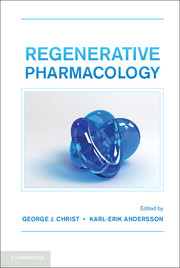15 results
Contents
-
- Book:
- Regenerative Pharmacology
- Published online:
- 05 April 2013
- Print publication:
- 15 April 2013, pp vii-viii
-
- Chapter
- Export citation
Regenerative Pharmacology - Title page
-
-
- Book:
- Regenerative Pharmacology
- Published online:
- 05 April 2013
- Print publication:
- 15 April 2013, pp iii-iii
-
- Chapter
- Export citation
Section III - Future Applications of Regenerative Pharmacology
-
- Book:
- Regenerative Pharmacology
- Published online:
- 05 April 2013
- Print publication:
- 15 April 2013, pp 235-328
-
- Chapter
- Export citation
1 - Introduction to Regenerative Pharmacology: A Short Primer on the Role of Pharmacological Sciences in Regenerative Medicine
- from Section I - Basic Principles of Regenerative Pharmacology
-
-
- Book:
- Regenerative Pharmacology
- Published online:
- 05 April 2013
- Print publication:
- 15 April 2013, pp 3-14
-
- Chapter
- Export citation
Regenerative Pharmacology - Half title page
-
- Book:
- Regenerative Pharmacology
- Published online:
- 05 April 2013
- Print publication:
- 15 April 2013, pp i-ii
-
- Chapter
- Export citation
2 - Regenerative Pharmacology of the Bladder
- from Section I - Basic Principles of Regenerative Pharmacology
-
-
- Book:
- Regenerative Pharmacology
- Published online:
- 05 April 2013
- Print publication:
- 15 April 2013, pp 15-33
-
- Chapter
- Export citation
Copyright page
-
- Book:
- Regenerative Pharmacology
- Published online:
- 05 April 2013
- Print publication:
- 15 April 2013, pp iv-iv
-
- Chapter
- Export citation
Section II - Enabling Technologies for Regenerative Pharmacology
-
- Book:
- Regenerative Pharmacology
- Published online:
- 05 April 2013
- Print publication:
- 15 April 2013, pp 73-234
-
- Chapter
- Export citation
Index
-
- Book:
- Regenerative Pharmacology
- Published online:
- 05 April 2013
- Print publication:
- 15 April 2013, pp 329-338
-
- Chapter
- Export citation
Section I - Basic Principles of Regenerative Pharmacology
-
- Book:
- Regenerative Pharmacology
- Published online:
- 05 April 2013
- Print publication:
- 15 April 2013, pp 1-72
-
- Chapter
- Export citation
Contributors
-
-
- Book:
- Regenerative Pharmacology
- Published online:
- 05 April 2013
- Print publication:
- 15 April 2013, pp ix-xiv
-
- Chapter
- Export citation
Acknowledgments
-
- Book:
- Regenerative Pharmacology
- Published online:
- 05 April 2013
- Print publication:
- 15 April 2013, pp xxi-xxii
-
- Chapter
- Export citation
Preface
-
-
- Book:
- Regenerative Pharmacology
- Published online:
- 05 April 2013
- Print publication:
- 15 April 2013, pp xix-xx
-
- Chapter
- Export citation
Dedication
-
- Book:
- Regenerative Pharmacology
- Published online:
- 05 April 2013
- Print publication:
- 15 April 2013, pp v-vi
-
- Chapter
- Export citation

Regenerative Pharmacology
-
- Published online:
- 05 April 2013
- Print publication:
- 15 April 2013



